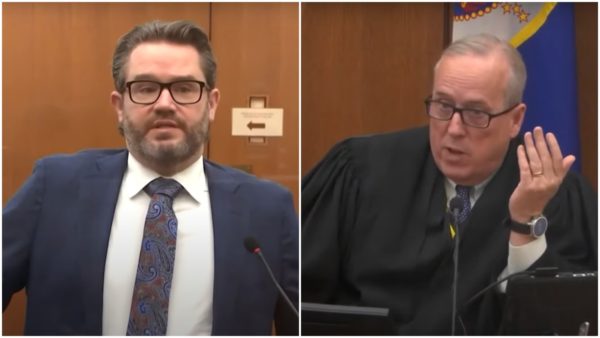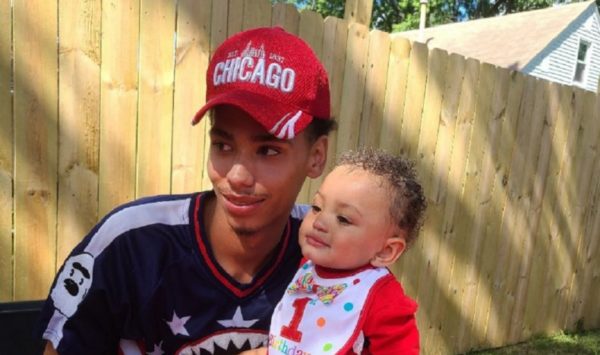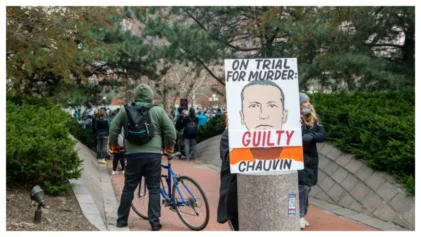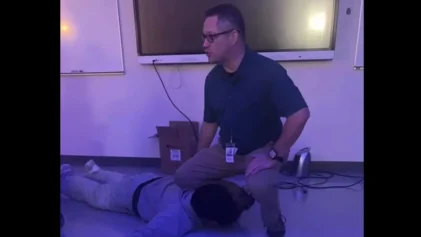The judge in Derek Chauvin’s murder trial has denied defense attorney Eric Nelson’s request to sequester the jury after the weekend shooting death of a 20-year-old Black man.
Nelson expressed concern that the recent events could sway the jurors as the trial continues through the third week of testimony.
Judge Peter Cahill rejected the request to re-question and sequester the jurors, adding that they will be fully sequestered when closing arguments begin next week
Daunte Wright, a 20-year-old father of a 1-year-old boy, was fatally shot on Sunday afternoon by Kim Potter, a 26-year veteran of the Brooklyn Center police force.
Authorities said Potter accidently discharged her firearm, but intended to deploy a stun gun. After the shooting, protests continued for two consecutive nights, after Wright was shot and killed in Brooklyn Center just miles from where George Floyd died in May 2020.
Police Chief Tim Gannon said on Monday, April 12, “It is my belief that the officer had the intention to deploy their Taser, but instead shot Mr. Wright with a single bullet.”
Nelson told Cahill on Monday that there is it least one juror who is a resident of Brooklyn Center, and that other jurors had “connections” to the city. He requested that the jurors be sequestered and that they be questioned about their exposure to media related to Wright’s death.

“This is obviously a high-profile case, this is a case that evokes a lot of emotion from a lot of people. Ultimately, your honor, the question becomes, will the jury be confident to make a decision regardless of the potential outcome of their decision.”
According to Nelson, because the verdict will “have consequences,” jurors might be concerned about what could happen if the public does not agree with the decision. He said the “emotional response” the recent shooting evokes could intensify the jurors’ concerns.
Cahill denied the motion, saying, “This is a totally different case.” He said that if someone learned the identity of one of the jurors and reached out in order to tamper with the case, that would be a cause for sequestration. He said sequestration could possibly “aggravate” the situation because it could cause the jurors to believe there are new threats to their safety.
“I think the better way is just to continue with the trial as its been going…that’s a separate issue,” he added, saying he doesn’t think the recent civil unrest should “heighten the jury’s concern.”
Nelson added as he made the request that he has believed the jurors should have been sequestered since the beginning of the trial, and that they should be warned twice each day to avoid all media.
The state opposed the motion.
“World events happen…we can’t have every single world event that might affect somebody’s attitude or emotional state or anything be the grounds to come back and re-voir dire all the jurors,” said attorney Steve Schleicher.
Chauvin faces charges of second-degree unintentional murder, third-degree murder and second-degree manslaughter in Floyd’s death.
Wright was shot on Sunday, April 11, after police pulled him over because air freshener was hanging from his rearview mirror, according to his mother, Katie Wright. Police learned after stopping him that Wright had a misdemeanor warrant, and attempted to take him into custody. When Wright got back into his car, Potter fired at him, striking the 20-year-old in the chest. He drove for several blocks before colliding with another vehicle. Wright was later pronounced dead.

The Hennepin County Medical Examiner has ruled his death a homicide. Body camera footage of the shooting was also released on Monday.
Protesters gathered in the aftermath of the shooting and erected a sculpture of a raised wooden fist. Flowers and candles were brought to a vigil on Monday to honor Wright. The vigil began at 6 p.m.
Minneapolis Mayor Jacob Frey declared a state of emergency and a 7 p.m. curfew amid continued demonstrations.
“He was my son,” Katie Wright said at the vigil. “And I can never get that back, because of a mistake, because of an accident?”


